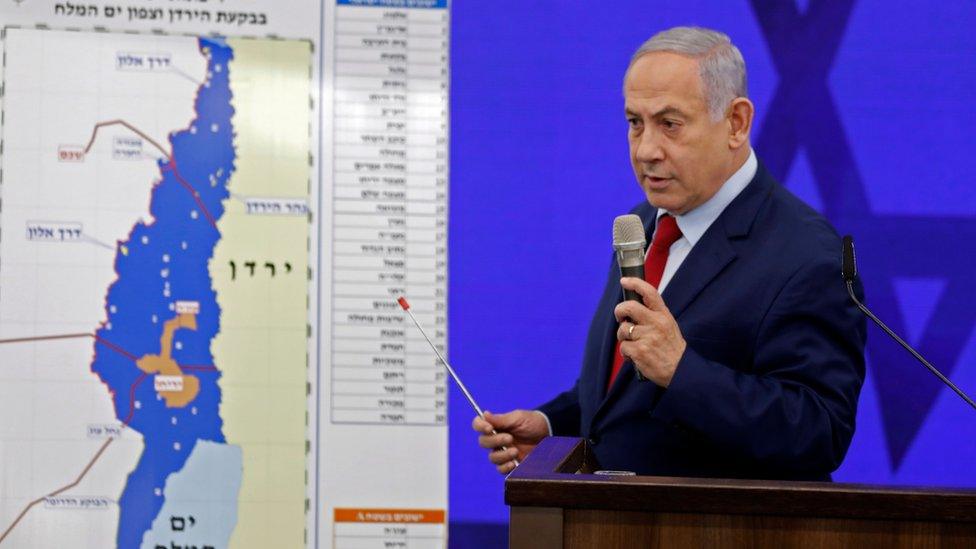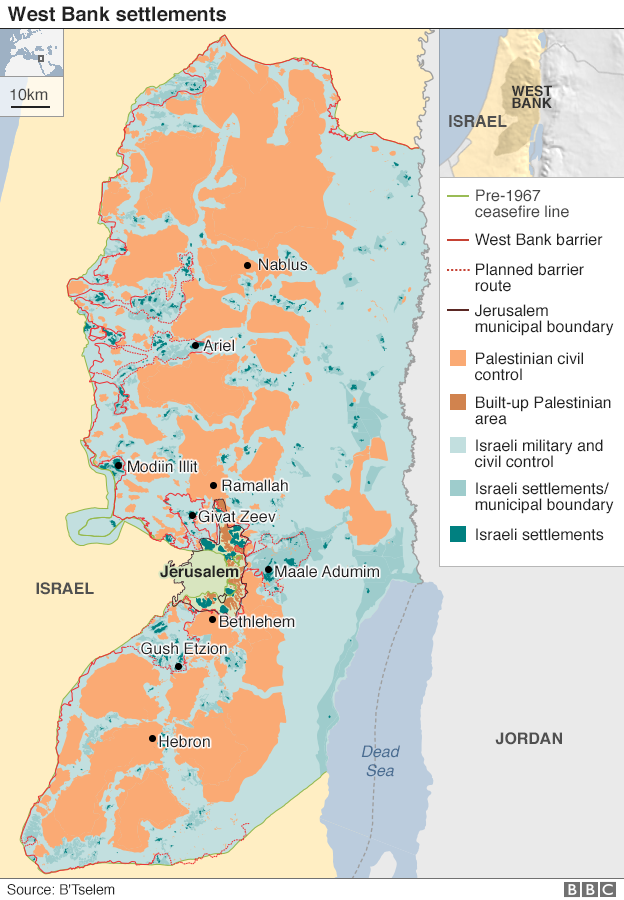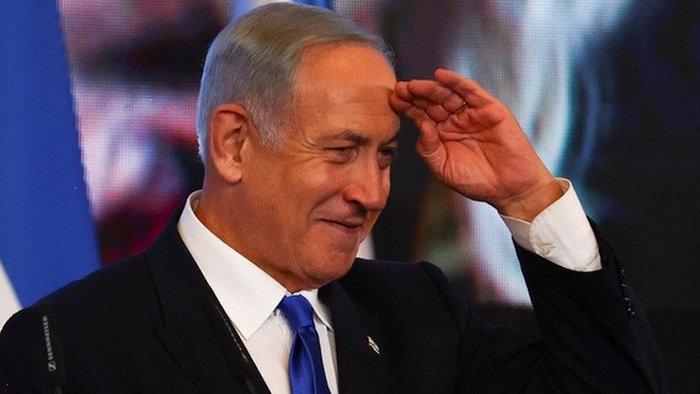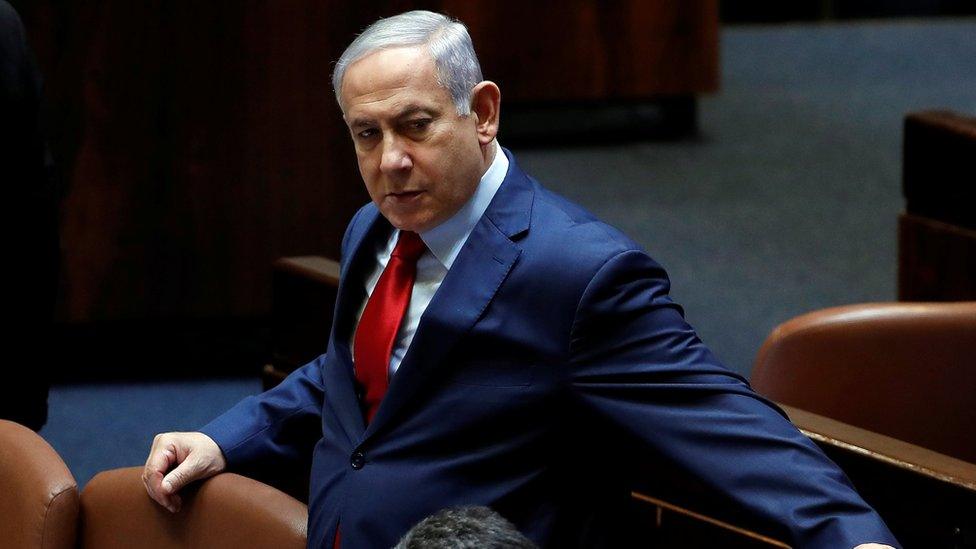Arab nations condemn Netanyahu's Jordan Valley annexation plan
- Published

Mr Netanyahu announced his plan, ahead of an election, on television on Tuesday
Arab nations have condemned a plan by Israeli PM Benjamin Netanyahu to annex a third of the occupied West Bank.
On Tuesday Mr Netanyahu pledged to apply Israeli sovereignty over the Jordan Valley and northern Dead Sea if he is returned to office following a general election next week.
Officials in Jordan and Saudi Arabia sharply criticised the announcement.
The Palestinians said the move would be "illegal", while the UN said it would destroy the chance of new peace talks.
The annexation proposed by Mr Netanyahu would "bury any chance of peace", said chief Palestinian negotiator Saeb Erekat.
Israel has occupied the West Bank since 1967 but has stopped short of annexation.
Palestinians claim the whole of the area for a future independent state. Mr Netanyahu has previously insisted Israel would always retain a presence in the Jordan Valley for security purposes.
A UN spokesman said the proposed annexation would have "no international legal effect".
Why is Netanyahu saying this now?
The Israeli PM, whose right-wing Likud party is neck and neck in the polls with an opposition centrist alliance, unveiled the plan in a televised address.
"Today, I announce my intention, after the establishment of a new government, to apply Israeli sovereignty to the Jordan Valley and the northern Dead Sea," Mr Netanyahu said.
He said this could be done immediately after the election if he received a "clear mandate" from Israeli citizens.
He said the move would allow Israel to seize a historic opportunity, but his domestic political opponents dismissed the pledge as an election stunt.
He also again pledged that he would annex all Jewish settlements in the West Bank, but said this would need to wait until the publication of US President Donald Trump's long-awaited plan for a peace agreement between Israelis and Palestinians.
Mr Netanyahu first made that pledge ahead of an election in April. But after the vote he failed to successfully form a workable coalition government, paving the way for next Tuesday's snap election.

The BBC's Middle East Correspondent, Tom Bateman, says the prime minister's announcement is likely to help him shore up support on the political right.
Blue and White's co-leader, Yair Lapid, hit out at Mr Netanyahu, insisting he "doesn't want to annex territories, he wants to annex votes".
"This is an election trick and it's not even a particularly successful trick because the lie is so transparent," he said.
Meanwhile White House officials said that US policy remained unchanged.
Mr Netanyahu was forced to leave the stage as sirens sounded in Ashdod
Later on Tuesday, Mr Netanyahu was whisked off stage by bodyguards during a campaign event in Ashdod, a southern city, as air raid sirens went off.
Israel said it shot down two rockets that had been fired by Palestinians from the Gaza Strip. Mr Netanyahu continued his speech several minutes later.
In response, Israel said early on Wednesday that its aircraft had hit 15 targets in Gaza, including a weapons facility.
What's the reaction?
A spokesman for UN Secretary General Antonio Guterres said the move would be "devastating" to the prospects of revived peace negotiations.
"Any Israeli decision to impose its laws, jurisdictions and administration in the occupied West Bank is without any international legal effect," Stéphane Dujarric added.
The Arab League - an organisation of 22 states - said Mr Netanyahu's plan was a "dangerous development" that would violate international law and "torpedo" the foundations of peace.
Senior Palestinian official Hanan Ashrawi said the plan was "unquestionably reprehensible" and a "threat to international peace and security".
"This announcement is a declaration of war against the Palestinian people's rights as well as the very foundations of the international rule-based order," she said.

The fertile Jordan Valley makes up a quarter of the West Bank
Jordan's Foreign Minister, Ayman Safadi, called the plan a "serious escalation" and warned it could "push the whole region towards violence".
Turkey's Foreign Minister, Mevlut Cavusoglu, described the pledge as "racist" and criticised Mr Netanyahu for "giving all kind of illegal, unlawful and aggressive messages" before the election.
Saudi Arabia also condemned the announcement on state media as a "very dangerous escalation" and called for an emergency meeting of the foreign ministers of the 57 member states of the Organisation of Islamic Cooperation (OIC) in response.

The politics behind the move

The Jordan Valley is a fertile strip of land running along the Jordan border that comprises nearly 30% of the West Bank.
It is sparsely populated - home to around 65,000 Palestinians and 11,000 Jewish settlers. As such, it is the largest land reserve the Palestinians would have for the future development of an independent state.
But currently they are barred from entering or using about 85% of the area, according to the Israeli human rights group B'Tselem. That's because most of the territory was designated under the 1993 Oslo peace accords as "Area C", which means it's under full Israeli control.
Traditionally most Israelis, from deep right to centre-left, have seen the Jordan Valley as a vital security buffer with the Arab world, and have held that Israel would maintain some kind of military control there even under a peace agreement with the Palestinians.
So it was a relatively safe issue for Mr Netanyahu to link to his earlier promise to annex Jewish settlements in the West Bank, an agenda pushed by the right wing. In fact, many in the Israeli press dismissed the whole thing as an empty campaign promise designed to lure right-leaning votes in a hotly-contested election.
They focused as much or more on Mr Netanyahu rushing out of a campaign event because of rocket fire from Gaza, an image they said may prove more durable to voters than the Jordan Valley announcement.

What is the background to the West Bank issue?
Israel occupied the West Bank, along with East Jerusalem, Gaza and the Syrian Golan Heights, in the 1967 Middle East war. It effectively annexed East Jerusalem in 1980, and the Golan Heights in 1981, although neither move was accepted internationally for decades.


The Trump administration has since recognised both steps, overturning previous US policy. It remains unclear if its upcoming will advocate for a two-state solution - a plan which has dominated previous international diplomatic efforts to achieve peace in the region.
The fate of the West Bank goes to the heart of the Israel-Palestinian conflict. Israel has built about 140 settlements there and in East Jerusalem which are considered illegal under international law, though Israel disputes this.
- Published21 November 2024

- Published29 May 2019
